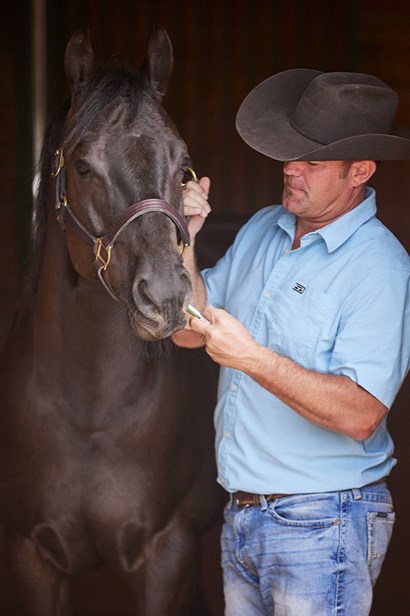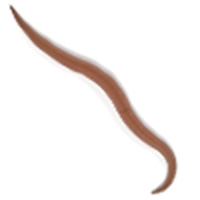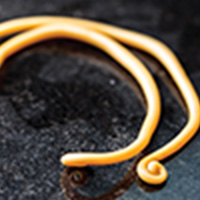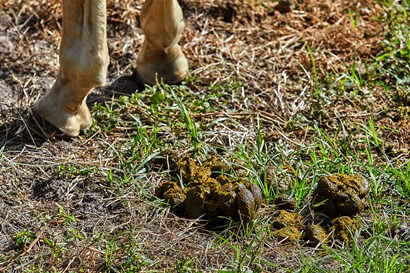The Modern Guide to Horse Deworming
An In-depth Look at Current Best Practices
Updated September 19, 2023
Today’s most effective strategy for safely deworming your horse involves a more targeted parasite control program. According to guidelines from the American Association of Equine Practitioners, a parasite control program should be designed with these three goals in mind:
- Minimize the risk of parasitic disease
- Control parasite egg shedding
- Maintain efficacious drugs and avoid further development of anthelmintic resistance as much as possible
By working with your veterinarian and taking a strategic approach to fighting parasites, you’ll do a better job of protecting your horse, your property, and the entire herd. Here, we’ll walk you through each step – from assessing fecal egg counts to picking the right type of dewormer – towards planning an evidence-based parasite control program.
Table of Contents:
- The importance of deworming
- Types of equine intestinal parasites
- How to deworm your horse
- Fecal egg counts
- Different deworming products
- Planning a deworming schedule
- Manure management strategies
- Horse owner questions
- Key takeaways
- Additional resources
Why Deworming is a Smart Choice

If you’re like any other horse owner who wants to take great care of their horse, the idea of them carrying a high load of parasites is enough to make you cringe. But it is important to remember that it is completely normal for horses to have parasites. The overwhelming majority of horses are perfectly happy and healthy living with their parasites. However, in rare cases, a high parasite load can lead to poor quality coat, weight loss, diarrhea, or colic.
Horses get infected with parasites, but it doesn’t happen exactly like getting infected with a contagious disease such as influenza or rhino (Equine Herpes Virus). All horses usually get worms when they’re turned out in a contaminated pasture. A horse can even re-infect himself with his own intestinal worms.
Fortunately, there is more you can do than cringe when it comes to parasite control. Along with proper environmental management to reduce parasite transmission (like regularly removing manure from pastures – not spreading it!), you can help reduce the parasite population with strategic deworming protocols.
Types of Equine Intestinal Parasites
Small Strongyles, aka Cyathostomins
Indiscriminate deworming practices have led small strongyles to developing a high resistance against multiple classes of dewormers. They encyst, or burrow, into the horse’s intestinal wall and then emerge, which damages tissue.

Large Strongyles, including Bloodworms
Large strongyles are extremely rare among managed horse populations. They migrate into the arteries of the horse’s abdomen causing damage to blood vessels. Although widespread anthelmintic use had nearly eradicated large strongyles, this parasite may resurge with inappropriate deworming practices.

Tapeworms (Anoplocephala perfoliata )
Tapeworms attach at the junction of the ileum and cecum in the horse’s hindgut, potentially blocking the GI tract and leading to colic. Although tapeworms are difficult to detect through fecal testing, blood and saliva antibody tests can show if your horse has been exposed.

Ascarids, aka Roundworms (Parascaris spp)
Roundworms migrate from the intestine through the circulatory system. Once roundworms enter the lungs, horses can cough them up and re-swallow them, completing their life cycle.

Bots and Pinworms (Gasterophilus spp and Oxyuris equi )
Bots burrow into the horse’s mouth and stomach, while pinworms lay eggs around the anus causing irritation. Both parasites are more of a nuisance than harmful to your horse’s health.

How to Deworm Your Horse: A Basic Foundation and Beyond
Deworming may be something you’ve been doing the same way for as long as you can remember—most likely rotating between anthelmintic paste products about every eight weeks or so. However, as drug-resistant parasites and the lack of new dewormers in the pipeline become increasing concerns, more and more horse owners, barn managers, and veterinarians are rethinking the way they deworm horses.
Nowadays, the strategy against parasites takes a more thoughtful approach beginning with one or two yearly treatments administered to all adult horses in the herd. These annual or bi-annual treatments are put into place as a basic foundation to target large strongyles and tapeworms, or the “non-cyathostomin” parasites.
Additional targeted treatments are applied to medium and high egg-shedders to bring down the parasitic population of cyathostomins. Next, we’ll explain the key to knowing if your horse needs more than two treatments annually.
Have a Fecal Egg Count Done for Your Horse
Your first step in developing your horse’s deworming program should be to consult your veterinarian for advice on having a fecal egg count (FEC) performed. In adult horses, the purpose of a fecal egg count is to measure the number of strongyle eggs your horse is passing in each gram of his manure.
You can either have your veterinarian perform the FEC for you or, if your vet doesn’t offer FECs, SmartPak offers a mail-away Equine Fecal Test Kit. Since the results will help you and your vet make the most appropriate choices for your horse, a good time to get your fecal egg count test completed is in the spring when parasite transmission season is about to start.

Assess Your Horse’s Egg-Shedding Level
When you send a sample to your veterinarian or independent laboratory, you get back a number such as 50 eggs per gram (EPG) or 500 EPG. That number tells you and your vet whether your horse is a low, medium, or high parasite egg-shedder, which in turn helps the both of you in developing your horse’s deworming plan.
If your horse’s fecal egg count results come back less than about 200 EPG (of feces), then your horse is likely a low egg-shedder. If the FEC results show more than 500 EPG, then your horse is likely a high shedder and needs to be dewormed more often. Your horse is unlikely to show signs of parasitism but can still be carrying adult worms that are laying lots of eggs, which spread across the pasture to other horses.
Horses and Parasites Will Always Cohabitate
Even if your horse’s FEC comes back negative, that does not mean your horse is parasite-free. Horses are grazers, so they’ll never be completely free of parasites. Your horse with a negative fecal still has intestinal parasites. However, those parasites simply aren’t shedding enough eggs to make it above the detection limit of the test.
Different Types of Dewormers
Once you have the results of your horse’s FEC, you can speak with your vet about which dewormer you should use and how often. There are a variety of deworming drugs, or anthelmintics each targeting specific types of parasites with their own methods of killing them.
| Active Ingredient | Product Name(s) | Small Strongyles | Large Strongyles | Roundworms | Tapeworms | Bots | Pinworms |
|---|---|---|---|---|---|---|---|
| Fenbendazole | Panacur® Powerpac Safe-Guard Paste | Widespread resistance | Full efficacy | Emerging resistance | - | - | Good efficacy |
| Oxibendazole | Anthelcide® EQ | Widespread resistance | Full efficacy | Emerging resistance | - | - | Good efficacy |
| Pyrantel Pamoate | Strongid Paste® Pyrantel Paste | Widespread resistance | Full efficacy | Full efficacy | Full efficacy in double dose | No efficacy | Variable efficacy |
| Ivermectin | Zimectrin® Duramectin™ Ivermectin | Emerging resistance | Full efficacy | Resistance | No efficacy | Good efficacy | High resistance |
| Moxidectin | Quest® | Emerging resistance | Full efficacy | Resistance | No efficacy | Variable efficacy | High resistance |
| Combo: Ivermectin + Praziquantel | Equimax® Zimectrin® Gold | Emerging resistance | Full efficacy | Resistance | Good efficacy | No efficacy | No efficacy |
| Combo: Moxidectin + Praziquantel | Quest® Plus | Emerging resistance | Full efficacy | Resistance | Good efficacy | No efficacy | No efficacy |
Planning a Targeted Deworming Schedule
It should be clear by now that there’s no “one size fits all” approach to deworming. Factors that play a role in your individual horse’s parasite control program and the deworming schedule of the entire herd include:
- His level of parasitic shedding
- Your geographic location, climate, and seasonality
- The age distribution amongst the herd members
- The stocking density and pasture quality of turnout
- Manure management on the farm
Low egg-shedders may only need to be dewormed twice a year, typically at the beginning and end of the grazing season, with a dewormer that contains ivermectin or moxidectin along with praziquantel (for tapeworms). Depending on region and climate, medium to high shedders should be dewormed additionally in the middle of summer or later in the fall. Speaking with your vet about your horse’s specific requirements and factors at play will shine the most light on his potential deworming schedule.
Fecal Egg Count Reduction Test
After you’ve put your parasite control plan into action, it’s a smart idea to perform a second fecal egg count test 10 to 14 days after deworming to check the treatment effects. This is called a fecal egg count reduction test (FECRT) and it is recommended to include at least 6 horses in the test, if available. Scientists are discovering more and more resistance to commonly used dewormers. So, it is important to make sure that the number of eggs being shed in your horse’s manure fall within the targeted range after the deworming.
Manure Matters
A core part of your horse’s parasite control program is the amount of manure in his environment. Many parasites begin their lives in a manure pile, so strong management practices can significantly reduce the chances of extending their lifespans.


Horses typically try to avoid grazing close to areas where they defecate, but when grazing is limited, they’re forced to find grass closer to manure piles. This proximity puts them at a higher risk of ingesting parasite larvae. Strongyles also exist on the lower portion of grasses, so horses are more at risk as they chomp down further and further. Here are some strategies for mitigating parasites:
- Be proactive in cleaning paddocks and picking up manure.
- Avoid overstocking the pasture with too many horses so the land does not become overgrazed.
- When implemented correctly, rotational grazing can allow pastures to rest and regrow.
- Turnout other animals such as cows, sheep, goats, llamas, or alpacas on the pasture. These species aren’t susceptible to equine strongyles and will eat the higher grass around the manure piles. This will, in turn, decrease larval survival on the pasture as there will be less protection from shade and moisture.
- Properly compost manure and bedding. Never spread non-composted manure on pastures as this will allow parasites to flourish across the entire pasture.
Still Not Sure When You Should Deworm Your Horse?
Dr. Lydia Gray explains the importance of deworming and when the best times of year are to deworm your horse in the video below.
Please note that foals, weanlings, and young horses less than about three years of age require special deworming protocols as they have immature immune systems. They can carry different parasites than adult horses, requiring different chemical classes and frequency of dewormer treatments. Speak with your vet about steps to take for safely deworming your filly or colt.
Put Your Parasite Control Program into Action
And that’s it! Creating a targeted parasite control program for your horse really is easier than it sounds at first. In actuality, it is less work, less expensive, and more effective than the rotational deworming schedule of the old days. By following the simple steps outlined above and working with your veterinarian, you’ll be doing a better job of protecting your horse, his living environment, and the few effective dewormers left!
Already armed with the results of your horse’s fecal egg count test and the advice of your veterinarian? Check out our selection of dewormers here.
Additional Resources
- Watch our Equine Fecal Test Kit Review
- Video on How to Interpret Fecal Egg Counts
- Internal Parasite Control Guidelines by the American Association of Equine Practitioners (AAEP)
Special thanks to equine parasitologist Dr. Martin K. Nielsen of the University of Kentucky’s Gluck Equine Research Center for his thoughtful and thorough review of this article.
SmartPak strongly encourages you to consult your veterinarian regarding specific questions about your horse's health. This information is not intended to diagnose or treat any disease and is purely educational.
Article first published 10/3/2017